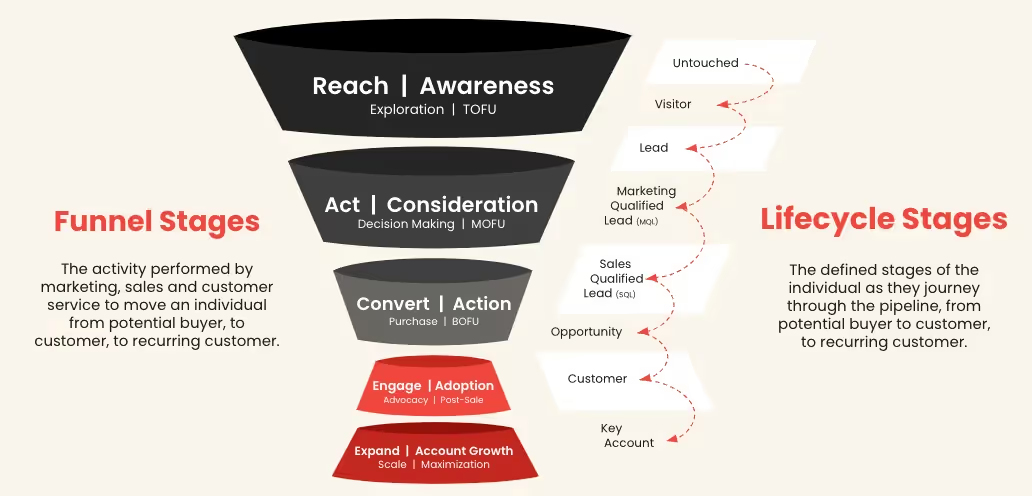Demand generation is a full-funnel approach that’s designed to provide information at the moment of need.
Demand gen is critical to success today in B2B marketing. It’s a strategy that builds brand awareness and demand for your products and services. Today, demand generation uses multiple channels and approaches with decentralized information used across platforms.
Despite the power and efficacy of demand generation, there are many persistent misconceptions. Here’s a look at 7 myths about demand generation and why they’re inaccurate.
Misconception #1: Demand Generation and Lead Generation Are the Same Things
People incorrectly believe lead generation and demand generation are one in the same. However, they are very different in scope and practice.
Lead generation is a much more basic sales strategy that’s focused on a singular goal: obtaining more leads. It’s a basic approach that’s designed to collect contact information from customers who might be interested in your product or service.
Lead generation takes a blanket approach to market to the masses. One example: using blogs or webinars to entice readers to leave contact information on a web form.
This is not to diminish lead generation. There are effective ways to garner more leads. Many businesses, impatient with the time needed to deploy demand generation, turn to lead generation instead.
Demand generation is a more comprehensive approach to sales and marketing. With demand gen, you will attract, convert and keep customers.
Demand generation is about nurturing relationships at each stage, as opposed to lead generation, which is more transactional. Instead of passing leads on to a sales team for follow-up, demand gen looks to meet prospects and customers where they are.
With demand generation, you identify what a customers’ needs are and provide solutions, whether it’s content, free tools, or product guides. These solutions are dependent on where a customer is in their journey. They can be personalized using data gleaned from the customer relationship.
Misconception #2: Demand Gen Is a Top-of-the-Funnel Activity
It’s a common misconception that demand generation focuses exclusively on the top of the funnel. Generating demand, however, is not just about acquisition. It’s about engaging and re-engaging customers.
Demand generation takes the long view. It’s about obtaining new prospects and converting those prospects. It’s also about reinforcing your brand and continuing to provide value throughout the lifetime of a customer’s relationship.
Misconception #3: You Can Control the Buyer Journey
Demand generation marketing is not about controlling the buyer. In fact, today, the buyer has more control over the customer journey than ever before.
Why? First, the expectations are different. Customers want relationships with the brands they use. They expect brands to know the extent of the engagements, their preferences, and their needs.
In addition, buyers today have lots of information available, including independent product reviews, message boards, and social media channels. These forums give buyers far more insights into your products and services and the ability to do their own research.
With buyers having information and freedom, demand generation is the right choice. You cannot control the buyer but you can be prepared to meet them where they are.
Demand marketing focuses on having high-value information available at every stage of the buyer’s journey. Creating great content and using your CRM to manage buyer engagements results in better outcomes for buyers and your brand.
Misconception #4: Demand Generation Is a Singular Approach
Demand generation is not a singular strategy to use for your marketing. Instead, it’s the collection of multiple marketing initiatives, across multiple channels.
These activities are coordinated, integrated, and driven by shared data. They also are evolutionary and iterative. If one approach is not working, such as search engine display ads, demand gen allows for rapid pivots. You can shift out of one strategy and try another.
The key is to develop a strategy that engages prospects and customers across channels. Social media, web, SEO, email, video, and other channels all factor into engaging your target audience.
The reason for this approach is evident. Your buyers do not operate on one channel only. Your marketing should not, either.
Misconception #5: There Are No Targets in Demand Generation
With its multi-channel approach, demand generation sometimes suffers from an assumption that targets are not necessary.
The opposite is true. You should use targets for each challenge used. Targeting likely buyers on the right channel at the time of need is the smart move. It leads to higher levels of engagement and higher conversion rates.
Setting these targets requires some work. You need to know who your ideal customers are. You need to understand when they will be looking for solutions and where.
Misconception #6: Content Format Is Irrelevant
Not true: Walls of copy rich in information and stuffed with keywords is the way to go with content.
Remember, the buyer is in control of the relationship. And your brand will not be the only one creating content.
You need to cut through the clutter and noise. That means creating content in the format that your customers want. Increasingly, customers are interested in content in different formats – infographics, videos, and podcasts.
The good news is that often you can repurpose content. A Q&A video with a product manager can be converted into a blog post. A new product announcement can be used to create a graphic that explains key features and enhancements.
Misconception #7: You Need Channel Specialists to be Successful at Demand Generation
Channel specialists are certainly valuable. They know how to effectively manage one channel and bring expertise and experience to your business,
However, they are just that – a specialist who knows one channel, albeit well.
Demand gen requires the use of multiple experts who understand the big picture. You need a team that can work together on strategy messaging, execution, and measurement.
Matter Made helps B2B SaaS businesses grow. Our demand generation, go-to-market, growth marketing, and paid media services help brands attract more customers and convert more sales.
To learn more about how Matter Made can optimize your demand generation strategy, contact us today.













